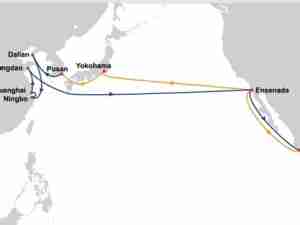'NOAA is committed to providing real-time environmental data through PORTS' and other integrated ocean observing systems to ensure safe, efficient navigation within our nation's ports and beyond,' said John H. Dunnigan, NOAA assistant administrator for the National Ocean Service. 'NOAA is pleased to add the Port of Mobile to the nationwide PORTS' network.'
Administered by the NOAA Center for Operational Oceanographic Products and Services, PORTS' measures, integrates, and disseminates observations of water levels, currents, salinity, wind, and bridge clearance. Knowledge of environmental conditions can significantly reduce the risk of vessel groundings and increase the amount of cargo moved through a waterway by enabling mariners to safely utilize every inch of dredged channel depth. Port of Mobile PORTS' data are updated every six minutes and thoroughly quality controlled to ensure accuracy.
'PORTS' gives our shippers, pilots, and regulatory agencies important, real-time information on navigational conditions, which allows for the optimization of cargo carriage and improves safety,' said James K. Lyons, director and CEO of the Port of Mobile. 'We are a proud sponsor of this important technology at the Port of Mobile.'
While designed to be of service to the marine transportation community, the data is freely accessible on the Internet at http://www.tidesandcurrents.noaa.gov/ports. NOAA PORTS' information users include port authorities, vessel pilots, shipping companies, US Coast Guard, US Navy, recreational boaters, fishermen, coastal managers, environmental organizations and academia.
The Mobile system brings to 14 the number of PORTS' in operation around the nation. Studies have shown more than a 50% decrease in vessel groundings following the installation of PORTS' in other areas. Estimates of economic benefits directly attributed to PORTS' range from $7 million per year for Tampa Bay to $16 million per year for Houston-Galveston. The Port of Mobile is the 11th largest in the United States, handling 24 million tons of cargo in 2006, accounting for $89.5 million in revenue.
NOAA, an agency of the US Commerce Department, is celebrating 200 years of science and service to the nation. From the establishment of the Survey of the Coast in 1807 by Thomas Jefferson to the formation of the Weather Bureau and the Commission of Fish and Fisheries in the 1870s, much of America's scientific heritage is rooted in NOAA.
NOAA is dedicated to enhancing economic security and national safety through the prediction and research of weather and climate-related events and information service delivery for transportation, and by providing environmental stewardship of our nation's coastal and marine resources. Through the emerging Global Earth Observation System of Systems (GEOSS), NOAA is working with its federal partners, more than 70 countries and the European Commission to develop a global monitoring network that is as integrated as the planet it observes, predicts and protects.






